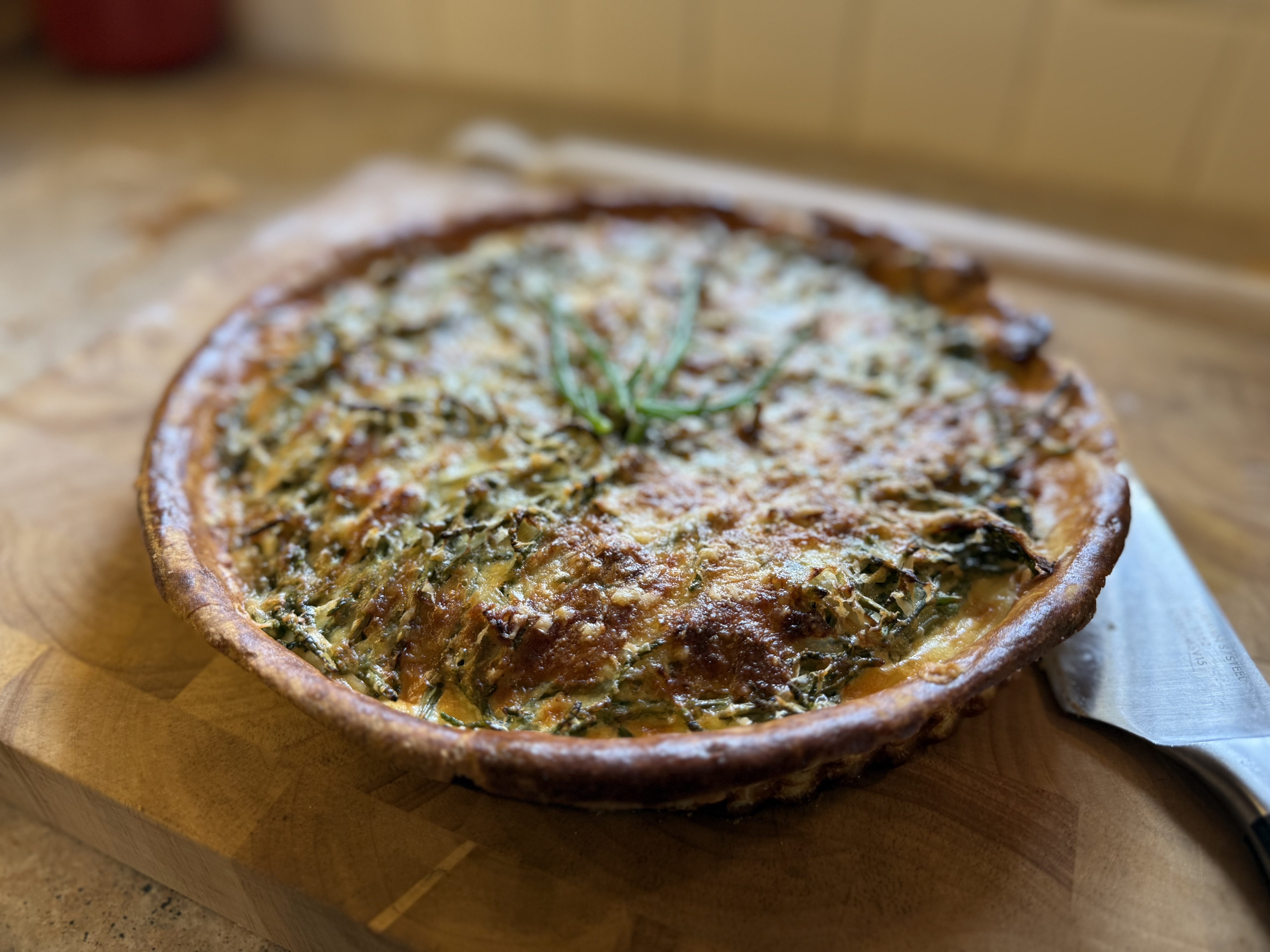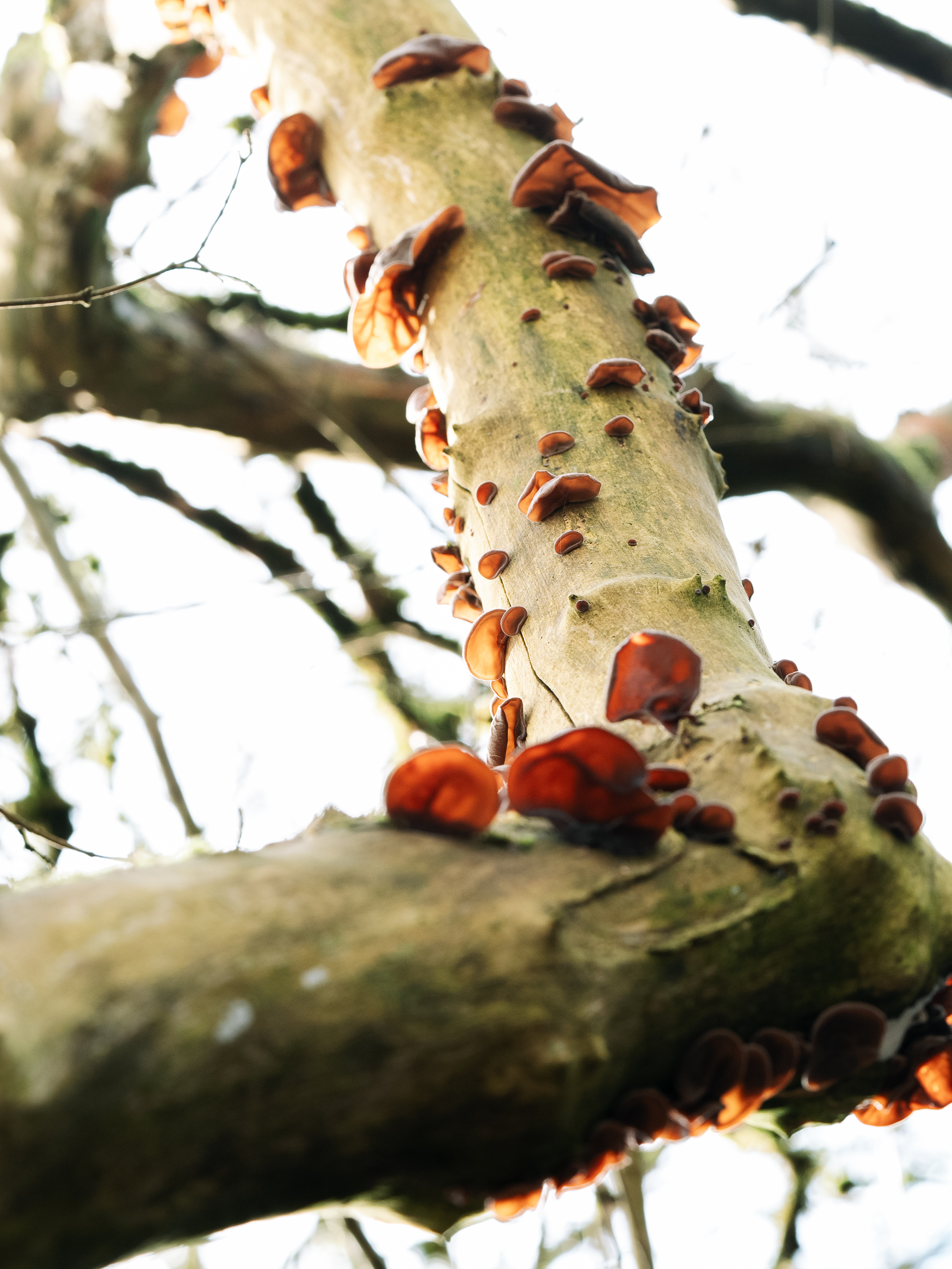
Foraging Sustainably (The Outdoor Guide, August 2025)
You can read the original article here: https://theoutdoorguide.co.uk/blogs/tog-blog/foraging-august-2025-sustainability-and-marsh-samphire-quiche/
If you take the stance that safety is paramount and that you should avoid breaking the law in whatever actions you do, the next most important factor to consider when foraging for anything is to make sure you do it sustainably. What that means to different parties does vary considerably, but I think we can all agree that whatever one chooses to do in life, it would be great if we could all leave the planet in a better shape than when we found it.
‘Sustainability’ as a term can be misrepresented, bastardised or buzzworded and is often used deliberately vaguely, to tick boxes or even to greenwash. In short, it is tricky to define due to modern usage - you will see the same trick pulled with words like ‘fresh’, ‘green’ or ‘natural’, which give the impression of being good but actually have very little meaning or legal heft to them. I think that can sometimes mean that people think anything that causes any damage to anything in the natural world is automatically unsustainable. As far as I can tell, sustainability really is about longevity, so any so-called ‘damage’ should only be immediate and with brief consequences, not affecting things in the long term.
What do I mean by that exactly? Well, take gardening for example. Any gardener worth their salt will have an annual routine of pruning, dead-heading, pinching out, mowing, cutting back, trimming and maybe even strimming*. These actions do not kill the plant (unless that is the aim, and even then you might struggle to do so) and in most cases actually encourage more vigour and more flowers, in turn creating more fruit and seeds. Are these tasks unsustainable? Patently not. But they do cause some minor damage in the short term, allowing for greater yield in the longer term.
So that is the prism through which you need to view foraging. I could reel off a good few hundred different plants (we will come to mushrooms shortly) that are good for eating, but you will find that most of them will only have a tiny part that suitable for eating. Take nettles: they are delicious, very good for you and abundant. But you would never pick the whole plant for consumption as it would leave you with a stringy and rather composty-tasting risotto. Instead, we pinch out the nettle tops - my guidance is usually that if it snaps easily it chews easily - leaving the rest of the plant behind to continue growing, reproducing and being a food source or habitat to other creatures. Foraging is sustainable by its nature and I must say that it rather grinds my gears when people think of it in any other way. There is sometimes a correct technique and often best practice when it comes to harvesting things, but that would apply to anything you might do in life. Shouty people on the internet will often point to foragers ruining certain natural spaces (they love the word ‘stripping’ or ‘gangs’) but these complaints are only ever anecdotal and I am yet to see any solid evidence that it is foragers, professional or amateur, who are doing said damage, let alone if there was any in the first place. There might be a few more patches of wild garlic briefly missing in your local woods - and that isn’t the way to pick it, even if it still does relatively minimal long-term damage - but it will be back next year, just as strong as ever. Much like all those herbaceous perennials in your border will be after their regular hacking back.
However you spin it, foraging is the method to source your food with the lowest possible environmental impact. Seasonal: tick. Low air miles: tick. Encourages nature and wild spaces to flourish: tick. Is better for soil health: 100%. Better for living creatures: absolutely. Lower impact on destruction of habitats: yes, yes and yes again. I could go on. I will tread carefully** so as to avoid this becoming a polarising issue (we can attribute many of the world’s problems to an Us vs Them culture) but run a quick comparison between foraging and standard farming practices and you will see the difference.
We absolutely need to farm food in order for our species to survive, living in the post-agricultural world we now do, but when the model is to take from a system more than it can cope with (i.e. in an unsustainable manner) then it is just no comparison. In short, you generally forage by taking the bit you need and leaving the rest of the plant behind to continue growing. By comparison, you generally farm a plant by removing the whole plant from the soil and then taking the bit you need (I accept that fruit and perennial plant harvesting is different). If foragers acted like this then yes, I admit that it would be unsustainable. I used to have a line in my argument that went along the lines of comparing the impact I would have on the environment by suggesting that a mower or hedge-trimmer would do more ‘damage’ in one session than I would be able to do in a year of foraging. Extrapolate that to a hedgerow being flailed, a field being ploughed, a forest being felled for timber or a roadside verge being strimmed to a fine dust and you can probably see my point.
“But if everyone started foraging then there would be nothing left!” - anon, Facebook, July 2025
This is an odd argument. If everyone drove their car tomorrow, there would be back-to-back traffic jams for days. If everyone had a bath this evening, the reservoirs would empty within hours. As glorious as this untelevised revolution would be, that is just not going to ever happen. Besides, the general feedback from my workshop guests is that there is far more to forage out there than people generally realise. Plus, more foragers means more people who know and care about nature. That can only be a good thing. Throw into the mix conversations about land usage and access, or perhaps even food security and how farmed crops can’t keep up with a changing climate, and perhaps the inclusion of a little more wild food in our diets suddenly starts to look a lot better for the environment overall.
To fungi. So far, my argument has very much rested on common sense and a bit of a reality check surrounding the culture of picking wild food. Fortunately, there have been several studies into the impact of foraging for mushrooms and the impact that has. Rather incredibly, it can now be said that the gathering of wild mushrooms does not affect future fruiting numbers. There’s that long-termism I was talking about earlier. Besides, the average person is unlikely to completely fill their basket with edible mushrooms - the vast, vast majority of fungi in the world will carry on just fine regardless of how many of us go hunting for them. Don’t forget that these are beings that have been around for many millions of years, surviving meteor impacts, moving land masses, ice ages and more, and will continue to exist long after humans have wiped themselves out. Of course, then you have to consider lugging them back to the car, the amount of freezer or dehydrator space you have, the rapid rate with which they can rot away if not processed for food or storage… sorry, I’m list-ranting again, aren’t I? But you see my point: the fungi will be just fine, no matter how many of their fruiting bodies you help yourself to.
You will be reading this because you are a lover of the outdoors. That should mean that you subscribe to the ‘leave no trace’ ethic. You wouldn’t leave a mess after a picnic, empty your footwell into a layby or destroy precious upland habitats when wild camping, so take that into your foraging too: if someone can tell that you have been foraging in a space, you’ve probably done it wrong. Barring forensically studying a site, nobody should be able to tell that you have helped yourself to whatever it is that you have been gathering. That means you aren’t leaving a mess (an underappreciated but vitally important facet of enjoying the great outdoors) and you are leaving enough behind for the species to recover well in the short-term and for other species that may need it for food or habitat.
Finally, I would like to quote Jayson from East Neuk Seaweed when I met him a few months ago at the Scottish Wild Food Festival (you won’t find a single person there who considers foraging to be anything other than low-impact). He finished his excellent presentation by reminding us that “if we eat more seasonal, wild and local food, both we and the planet will be better off for it.” That has stuck with me ever since and I refer to it daily in both my workshops and my personal life. It is such a simple way of defining why eating wild food is better for us and the planet.
* A quick aside to politely ask you to reconsider strimming anything if you can avoid it - strimmers will indiscriminately chop any creature to bits, whether that’s your local frog population, hedgehogs, slow worms, mice and beyond. Get yourself a scythe instead!
** which is ironic considering that footfall really inhibits growth through soil compaction and erosion. I am a huge proponent of kids playing in the woods, but you are never going to find anything growing where you see a rope swing or den in the woods.





.jpg)
